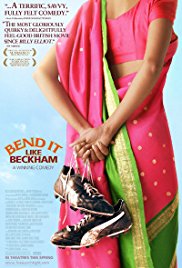Go over the following English terms. Most are slang. These will help kids understand the movie.
football = soccer;
bollocks = rubbish, nonsense, drivel; e.g.”That film was bollocks.” This is a slightly obscene term originally referring to the testicles of an ox;
bunked off = To shirk your duties. Adolescents use it to refer to avoiding lessons at school;
cow = a contemptible woman, a “bitch.” This is a derogatory term but it can also be used as an affectionate aside, as in “silly cow”;
to fancy = to like, as in a girl likes a boy;
gutted = not happy because of an event that has occurred that didn’t go your way;
kit = clothing; uniform, sports equipment;
over the moon = very happy, extremely happy; e.g., “I’m over the moon about that”;
Paki = an insulting term for a person of Indian descent;
pissed = drunk;
right = very (it is used as an intensive, e.g.”A right sob story” means “a very sad story”;
to sack = to fire from a job;
to shag = to copulate or have sex with;
slag = woman of loose morals;
strop = a bad mood, a fit of fury, e.g. “I don’t want you to get into a strop with me”;
stroppy = bad-tempered, argumentative;
a stuffing = a beating;
tatty = junkie, tattered;
wanker = a masturbator, or a contemptible person, or an idiot, an incompetent person.
Hindi Terms used in the movie:
goreh = white people;
dhania = coriander seeds;
achar = Indian pickle;
punjabi = most popularly spoken language in Punjab province in India;
dal = all varieties of dried beans, split peas, and lentils used in Indian cooking;
chapatti = flat pancake-like bread cooked on a griddle;
Aloo gobi = an Indian curry; aloo means potato and gobi means cauliflower;
choli = a midriff-baring blouse worn in India, Sri Lanka, Bangladesh, and other countries where the sari is worn. The choli is cut to fit tightly to the body and has short sleeves with a low neck. The choli is usually cropped, allowing exposure of the navel; the cropped design is particularly well-suited for wear in the sultry South Asian summers. Cut-out backs and front-opening buttons are some of the features of contemporary designs;
Saris = traditional dress for Indian women consisting of a long piece of cloth, usually brightly colored, wrapped around the body, the shoulder or the head.


